I have the following code (EDIT: Updated the code so everyone can compile it and see):
import UIKit
struct Action
{
let text: String
let handler: (() -> Void)?
}
class AlertView : UIView
{
init(actions: [Action]) {
super.init(frame: .zero)
for action in actions {
// let actionButton = ActionButton(type: .custom)
// actionButton.title = action.title
// actionButton.handler = action.handler
// addSubview(actionButton)
}
}
required init?(coder aDecoder: NSCoder) {
fatalError("init(coder:) has not been implemented")
}
}
class TextAlertView : AlertView
{
init() {
super.init(actions: [
Action(text: "No", handler: nil),
Action(text: "Yes", handler: { [weak self] in
//use self in here..
})
])
}
required init?(coder aDecoder: NSCoder) {
fatalError("init(coder:) has not been implemented")
}
}
class MyViewController : UIViewController {
override func viewDidLoad() {
super.viewDidLoad()
let alert = TextAlertView()
view.addSubview(alert)
self.view = view
}
}
Everytime I instantiate TextAlertView, it crashes on super.init with bad access. However, if I change:
Action(title: "Yes", { [weak self] in
//use self in here..
})
to:
Action(title: "Yes", {
//Blank.. doesn't reference `self` in any way (weak, unowned, etc)
})
it works!
Is there a way to reference self be it weak or not inside the action block during a super initialization (in the above I do it in a parameter to super.init?
The code compiles.. it just crashes at runtime at random.
